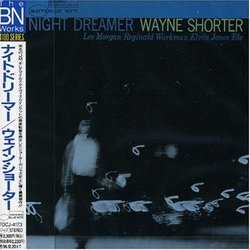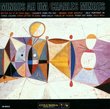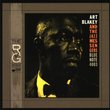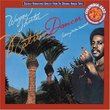| All Artists: Wayne Shorter Title: Night Dreamer Members Wishing: 1 Total Copies: 0 Label: Blue Note Japan Original Release Date: 1/1/2000 Re-Release Date: 11/22/2000 Album Type: Import Genres: Jazz, Pop Styles: Modern Postbebop, Bebop Number of Discs: 1 SwapaCD Credits: 1 |
Search - Wayne Shorter :: Night Dreamer
 | Wayne Shorter Night Dreamer Genres: Jazz, Pop
|
Larger Image |
CD DetailsSimilar CDs
|
CD ReviewsGreat lineup and great playing Douglas Gray | Rochester, NY | 03/11/2000 (5 out of 5 stars) "This album is Wayne's first in a long series of classic recordings for the Blue Note label. In trying to put this session in perspective with his other mid-sixties recordings as a leader, I find that Wayne has not yet fully developed and presented his compositional skills. While "Night Dreamer" exhibits some fine performances by all, his second Blue Note, "JuJu", combines equally fine performances as well as some of Wayne's most notable compositions. His third Blue Note offering, "Speak No Evil" is very strong compositionally, yet lacks the vigor in the individual performances found here.Recorded in April, 1964, this session features Lee Morgan (trumpet), McCoy Tyner (piano), Reggie Workman (bass) and the incomparable Elvin Jones on drums. The rhythm section of McCoy, Reggie and Elvin had worked extensively together in John Coltrane's quartet, and Wayne and Lee as front men for Art Blakey's Jazz Messengers. Besides the long-standing relationships, these five jazz giants recorded many sessions in various combinations throughout the early sixties. That is not to say that the communication skills they must have developed are too obvious in this recording. They don't always seem to weave the same color and texture of fabric as we might expect.Night Dreamer - A simple, relaxing piece in 3/4 time. Wayne is typically expressive, and Lee is clean and sharp. McCoy's solo searches for but never finds a groove. Wayne takes us out with another equally revealing, gritty improvisation. Elvin provides his typical vigorous and strong presence.Oriental Folk Song - Nothing Oriental about this tune, a relaxed 4/4 swing number with a simple head. Wayne is short and sweet, but not one of best solos. Lee follows with a very nice solo that works from start to finish. McCoy is a bit weak again. Elvin wraps up with a few short, somewhat reserved solo fills.Virgo - A gorgeous Wayne ballad. Wayne's sound throughout is rich, eloquent and his notes soulful, yet optimistic. Reggie and McCoy's accompaniment is mature and sensitive, as is Elvin's brush work. A beautiful piece. Lee sits out.Virgo (alternate take) - Even more passionate than the primary take. I preferred this one. Absolutely wonderful.Black Nile - Finally, a composition in the more mature and uniquely Wayne style that has earned him the renown as one of great jazz composers of his time. The head features Wayne and Lee harmonizing in a spirited, energetic tempo. Wayne takes honors and digs real deep. Lee follows, and cooks behind some of Elvin's most explosive and inspirational drumming of the session. McCoy follows with one his best solos of the date. Elvin cleans up with a nice solo, then out.Charcoal Blues - A simple, yet interesting blues head followed by a rich, bluesy Wayne solo that creeps outside at the end, yet it really works, despite the blues changes lurking behind him. McCoy follows suit and pounds out a blues solo in his typical chromatic style, which works equally well. Lee sits out.Armageddon - Ahhh. Wayne's finest composition of the album - haunting and provocative. Wayne leads off with a great solo, during which the rhythm section works closely with him. Lee's solo is adequate, as is McCoy's.All-in-all, some very fine playing by some of the great jazzmen of the era. There is absolutely nothing wrong with this album, just a few things missing that we find on the later recordings of most of the players. Nevertheless, whenever you put these five guys together, something great must come of it, and this album is no exception. If you are a Wayne fan, a Blue Note fan, or simply enjoy listening to serious jazz without gimmicks and 1940s/1950s standards, then you'll cherish this album." Jazz at its Absolute Finest J. Lund | 06/11/2000 (5 out of 5 stars) "Wayne Shorter, Lee Morgan, and McCoy Tyner's Trio have recorded some of the best jazz, possibly, ever. All solos are beautifully constructed, and Shorter's solo on the title track is near unforgettable. A great buy for anyone interested is spectacular music." Wayne Shorter finding his niche among the greats of jazz! J. Lund | SoCal, USA | 01/30/2005 (5 out of 5 stars) "Shorter's first solo Blue Note album NIGHT DREAMER was recorded around the time he joined Miles Davis' quintet. Here the sidemen are from outside of Davis' regular circle -- note that all were associated with Coltrane to varying degrees -- including Lee Morgan (trumpet), McCoy Tyner (piano), Reggie Workman (bass), and Elvin Jones (drums). Shorter wrote or adapted all of the six tunes, including an altered blues ("Charcoal Blues"), a signature Wayne ballad ("Virgo"), and several mid-tempo vehicles for the soloists, including "Night Dreamer" and "Black Nile." As would be typical of Shorter's music, the tunes are distinctive and allow the group plenty of space to make individual statements as well. An impressive debut by any standards, and no surprise given Shorter's then-soaring reputation based on his work with Blakey and Davis."
|

 Track Listings (7) - Disc #1
Track Listings (7) - Disc #1

